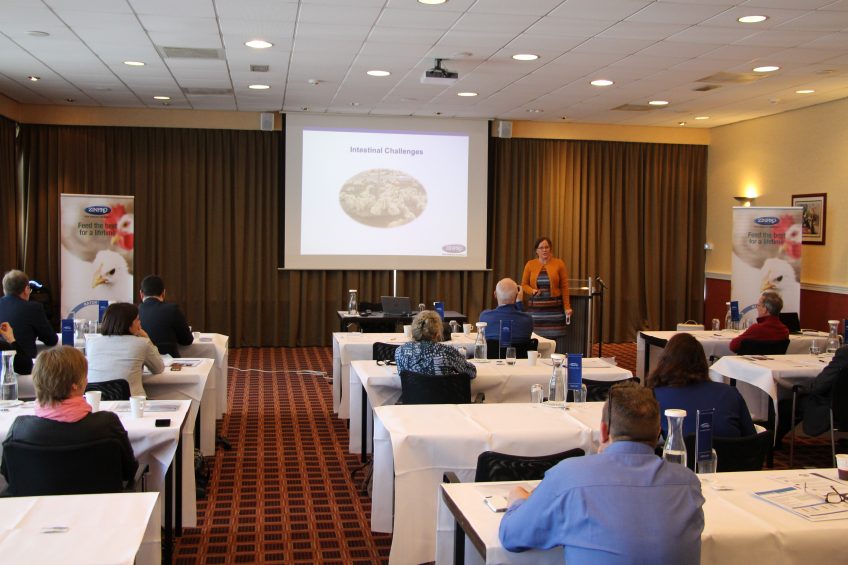Activating the immune system can come at an expense

During the pan-European poultry seminar in Amsterdam the most renowned immune system experts worldwide gave their vision on how to protect poultry best. One way to minimise losses due to immune activation is immunomodulation but this doesn’t replace good management or genetics.
Dr Annsofie Wahlstrom Ph.D., Research Nutritionist Europe Zinpro Corporation, kicked-off the seminar with her lecture ‘Mitigating intestinal challenges: What can complexed zinc do?’ According to her complexed zinc can mitigate intestinal problems. “It mitigates the impact of stress by decreasing intestinal permeability and leakage. Further decreasing invasion of pathogens to the liver, reducing intestinal lesions and improving gut morphology and improving immune response.” Zinc is one of the key trace elements that contribute to a more efficient immune system in addition to trace elements as copper, manganese, selenium and iodine.
Very important according to Dr Wahlstrom is the difference between inorganic and complexed minerals. “Zinc bound to amino acids is better absorbed in the small intestine (by the amino acids absorption pathways). Dr Wahlstrom: “The amino acid transporter is more efficient than the inorganic route.” The bioavailability of zinc from Availa zinc is (through the amino acid transporter), for example, 64% better than zinc from zinc sulphate.
Tight junction complex
All three speakers indicated that heat stress in particular but also other stressors cause leaky gut. As the permeability of the intestine increases transepithelial electrical resistance increases. To measure the effect of trace elements minerals on gut integrity, 21 days old broiler chickens were infected with Clostridium perfringens. Dr Wahlstrom: “This showed that both the transepithelial electrical resistance remained higher and plasma endotoxin concentration was lower by feeding a combination of zinc sulphate and complexed zinc compared to zinc sulphate as sole source of supplemental zinc. Thus indicating decreased gut permeability for endotoxins and other harmful substances.
Another point which Dr Wahlstrom highlighted during her presentation was the tight junction complex. The tight junction complex links the intestinal epithelium cells together and is important to create a tight gut barrier. Dr Wahlstrom: “That way, pathogens and toxins are not able to infiltrate through the intestinal wall. A zinc deficiency, however, can damage the tight junctions allowing toxins and pathogens to pass through the intestinal wall. Zinc is essential for the structural proteins of the tight junctions.” She also examined the effect of zinc on intestinal lesions when anticoccidials were removed from broiler diets at 35d of age. Birds fed complexed zinc turned out to have fewer intestinal lesions compared to a control group fed zinc sulphate. In addition to this reducing intestinal stress also resulted in improved broiler production performance.

Gastro-Intestinal Tract
The next speaker, Dr Lance H. Baumgard, who is a researcher at Iowa State University, USA, stressed that activating the immune system has implications for productivity. “Namely reduced feed intake and nutrient reprioritisation to non-productive functions.” Also heat stress increases carcass lipid and decreases carcass lean content. When the immune system is activated, but also during heat stress, the metabolism of animals is changed. Heat stress and malnourished animals have a similar metabolic fingerprint. Leaky gut is a common denominator in both. The activated immune system utilises a substantial amount of glucose. The next important question is; how much energy is lost through reduced feed intake, and how much due to activation of the immune system? Dr Baumgard: “Reduced feed intake explains a portion of decreased production during heat stress. Heat stress reduces lipolysis (break down of fat tissue) and increases insulin secretion.” According to research by various research institutes around the world it appears that heat stress reduces feed intake by about 30% to 35%. “Our research shows that during a challenge of the immune system, a significant amount of energy isn’t used for protein accretion (lean meat deposition). Instead it’s used by the immune system. The problem is that the immune system is difficult to examine because it’s everywhere in the body” says Dr Baumgard. Research in poultry shows that heat stressed broilers of 2,5 kg body weight lose about 42 g of glucose as a result of heat stress.

Immunomodulation doesn’t replace good management
According to Prof Douglas R. Korver, Ph.D. from the University of Alberta in Canada a large group of experts talk about boosting the immune system for a better resistance. “But I would be very careful with that option. You want to have an immune system that reacts when needed, but isn’t activated all the time.” Prof Korver explained that the immune system consists of two arms. Specifically the innate immune system, which puts the body into an inflammatory state and has a high energetic cost. Adaptive immunity, on the other hand, responds very specifically to the challenge with the help of antibodies and has a low energy expenditure. Based on work from Prof Korver and his co-author Prof Klasing 29% of losses in bird performance during immune activation are due to systemic immunity, metabolic inefficiencies, energy losses (fever, immunity, etc) and digestive inefficiencies. “One way to minimise losses due to immune activation is immunomodulation, which means to dampen the high cost response (innate immune response). But nutritional immunomodulation doesn’t replace good management and genetics.” The professor ended his talk by saying that the most important thing is to understand what the problem is and then look at which nutrient(s) or products may be able to nudge the immune system in the “right” direction.












